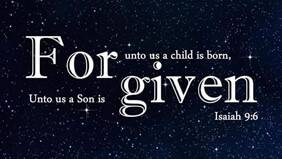Sermon preached at Faith Community Fellowship Church, Mount Vernon, WA on January 2, 2022
Text: Luke 2:1-20 PDF Download
Good Morning!
Well, it’s good to be back together to worship our God, isn’t it? What an absolute blessing it is for me to preach for you today. Thank you, Pastor Matt!
As you see, we’re going back to Christmas since we had to miss it last Sunday. So … Merry Christmas!
It’s easy to say: “Merry Christmas”, “Happy Christmas”, “Happy Holidays”, and so on, isn’t it?
But not everyone is always happy and joyful at Christmas, though, are they?
Christmas doesn’t always feel like a blessing, or even a good time, with all the stress of the holidays and the trappings that go along with it.
And, indeed, for some, Christmas is associated with considerable pain for a variety of reasons.
If that’s you, then our hearts go out to you. May the Lord bless you with His peace and strength.
To others, Christmas really is a time of deep joy. A time of reconnecting and rejoicing…
But regardless of how we may actually feel about it, Christmas is an objective and deeply profound biblical blessing for the people of God. And that’s what I’d like to take a closer look at with you in the next 30 minutes or so.
Let’s together look at the real Blessing of Christmas.
Here now the reading of the Word of Almighty God from the Gospel of Luke:
Luke 2:1-20
The Word of God, for the people of God. Thanks be to God.
Let us pray:
Almighty God, to Whom all hearts are open,
All desires known, and from Whom no secrets are hid.
Cleanse the thoughts of our hearts
By the inspiration of Your Holy Spirit,
So that we may perfectly love You
And worthily magnify Your Holy Name,
Through Christ our Lord.
Amen
In this text, we’re presented with numerous events, and while there is so much that could be said about them. I’d like to focus on just three things with you:
- The circumstances surrounding of the birth of Christ,
- Jesus' birth itself, and
- The story of Shepherds and their response to the birth of Christ.
The Circumstances of the Birth of Christ
Last time, Bill Craig spoke on Chapter 1 of Luke, so I’m not going to spend much time here except briefly as context for what follows today.
In Chapter 1, Luke writes that the virgin Mary is told by the angel Gabriel that she’s going to be overshadowed by the Holy Spirit and become pregnant with a son whom she is to name “Jesus”.
Of course, she couldn’t hold back knowledge of her pregnancy from her soon-to-be husband, Joseph, and he concluded what any normal human being would conclude – that Mary had been unfaithful. Matthew tells us that – hear this – because Joseph was a righteous man, he was going to divorce her quietly, rather than make a public spectacle of her, but God intervened:
Matthew tells us that Joseph is visited by an angel who says:
“‘Joseph, son of David, do not to be afraid to take Mary home as your wife, because what is conceived in her is from the Holy Spirit. She will give birth to a son, and you are to give him the name Jesus, because he will save his people from their sins.’” (Matthew 1:20-21)
Matthew goes on:
“All this took place to fulfill what the Lord had said through the prophet: ‘The virgin will be with child and will give birth to a son, and they will call him Immanuel’ – which means ‘God with us.’” (Matthew 1:22-23)
And here in the Gospel of Luke, we’re told that Mary went to visit her older cousin, Elizabeth, because the angel Gabriel had told her that she was likewise pregnant with John the Presbyterian … I mean, John the Baptist … to confirm with her that with God, all things are possible.
When we look closely at these passages surrounding the birth of Jesus Christ – as was pointed out by Bill Craig last time – these are profound fulfillments of prophecy.
Isaiah 7:14 Prophesied the virgin birth of Immanuel
Micah 5:2 Prophesied that Bethlehem would be the birthplace of ultimate King of Israel who is of old
And there are several more, post-Christmas day:
- The Wise Men
- Herod targeting the boys up to 2 years old for destruction
- Joseph and Mary moving to Nazareth
We need to remember that Luke is telling a truthful, fact-filled story. As such, he’s testifying about the birth of the Savior of the world. And in biblical categories, going way back into Deuteronomy, any testimony must be confirmed by two or three witnesses (Deut 19:15b). This is a message for another time, but just as couple of bullet-points here, Luke is literally going out of his way to provide such witnesses:
- Zechariah and Elizabeth – Luke 1:6 … “Both of them were righteous in the sight of God, observing all the Lord’s commands and decrees blamelessly”
- Joseph and Mary … as mentioned already – “righteous and devout” – full of integrity, doing everything required by the Law of the Lord (Luke 2:39)
- Simeon – Luke 2:25 … “righteous and devout” – full of integrity
- Anna – Luke 2:36-38 … “worshipped night and day, fasting and praying” … in other words: “righteous and devout” – full of integrity
All of it providing confirmation of the truthfulness of the birth of Christ in Bethlehem as prophesied by Micah (Micah 5:2).
But how did it come to pass?
In today’s passage, we see that in the Providence of God, it was the world’s most powerful ruler of the time who brought about the fulfillment of that prophesy. The Romans occupied and ruled Israel and Caesar Augustus was its ruler.
I don’t know about you, but when I was young, I hated history. Now I can’t get enough of it. It absolutely fascinates me. Unfortunately, we live in a day and age when the desire to purge history by rewriting it to fit an agenda is palpable. Very sad. It’s very important to learn from history, isn’t it?
And here in Luke Chapter 2, we have just a short passage detailing a piece of verified world history: that a census was ordered by fiat of Caesar Augustus while Quirinius was governor in Syria. It’s not the point of this message to do a deep dive into that history, but there are a couple of relevant points to note.
First, Caesar Augustus was not his name. Caesar was his title and Augustus was an adjective to describe him – even though as the second Caesar in world history he was quite ruthless in the beginning of his reign, he was nevertheless august and highly esteemed. In fact, the month of August was named after him.
His birth name was Gaius Octavius and he was related to Julius Caesar. Under his rule, he brought about what is known as the “Pax Romana” – the Roman Peace. And it was under this peace that roads were built throughout the Roman Empire which facilitated the spread of the Gospel after Christ’s crucifixion and resurrection.
I also find it quite fascinating that Caesar Augustus called himself “savior of the world”. (Commentary: “The Gospel According to Luke” by James R. Edwards).
And it’s under this same Caesar Augustus that a census is ordered. Now, what are the purposes of a census? Historically, it’s a way to take stock of those who are fit for military service and the other – indeed, its primary purpose – was for what?
That’s right – taxation.
Not to register to vote – remember, they are under Roman occupation. People were required to travel back to their hometown to register for taxation purposes.
So here we have the false savior of the world, providing a measure of worldly peace in the Pax Romana, being used in the Providence of Almighty God to fulfill the prophecy that the true Savior of the world will be born in Bethlehem who will bring real Peace to needy sinners.
Next, we have a young teenage girl, 9-months pregnant, having to travel 85-90 miles by foot and donkey to Bethlehem together with her new husband. That must have been a miserable journey – I can only imagine…
From a human perspective, it’s incredible she made it to Bethlehem at all before giving birth; but in the Providence of God, it was all pre-planned.
The Birth of Christ
And now that she is in Bethlehem, Luke tells us the time came for Mary to give birth, so she did and wrapped the babe in swaddling cloths and placed him in a manger … a feeding trough.
We see the pictures of the manger scene every Christmas. And we make decorations of it.
But step back for a minute just and think of it.
No crib available – instead a feeding trough, a manger, was the makeshift crib for the baby.
But who exactly was this baby?
We use words and language to talk about the Incarnation, don’t we? But we need to pause and really think deeply about this.
In the beginning, God created. He created all that is.
I’m not only fascinated with history, I’m mesmerized by astronomy. The stars, the planets, the sheer size of things and colossal distances between them.
I pulled these images off a Facebook post some time ago…
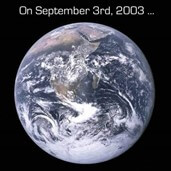
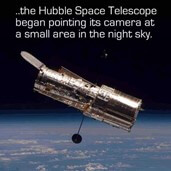
On September 3, 2003, the Hubble Space Telescope began pointing its camera at a small area of the night sky.
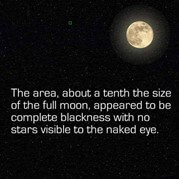
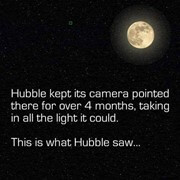
It was an area about 1/10 the size of the moon and was just black to the naked eye. For 4 months, Hubble stared at that spot. And what it recorded shocked the world. It became known as the Hubble Deep Space Field.
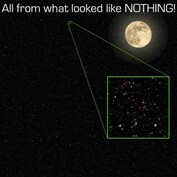

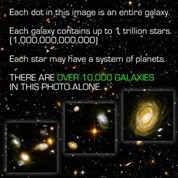
In the DSF, each dot is an entire galaxy, so there are quite literally multiple trillions of stars in it. A mind-boggling, colossal distance away. And now just last week, the James Webb infra-red telescope was deployed in space. When it eventually comes online, its images will doubtless blow our minds as it shows us even more of Creation.
What a Master of Creation God is, right?
But the God who created all that is also a Master of the tiny details.
These are the components of a cell – a common enough drawing for use in schools.
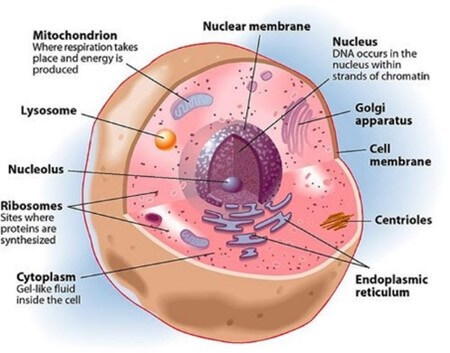
In my day job, this is how I see cells…

And then the electron microscope shows us amazing cellular detail like this…
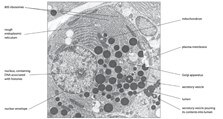
But these are the ultrastructural components of a cell using a model put together by Harvard University. Just stunning extreme microscopic detail.
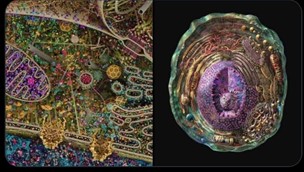
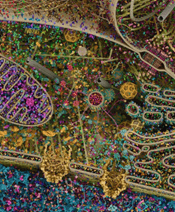
But here’s the thing … the Creator of the macroscopic Universe and every single individual microscopic cell in your body decided in eternity past to create life and make that life in His own image. To rule over His creation and make choices.
But that new life rebelled against His authority and fell into sin.
And being a Just and Holy God, He could have extinguished that life as He said He would – “you sin, you die!” – and could have gone on perfectly well without it.
But God…
If you ever want a title for the Gospel message, that’s it: “But, God…”
Instead of dispensing immediate justice, God chose to redeem His creation and do something about our sin problem. Which meant He had to condescend to our need.
God planned it all and God acted on it. And this required that the second person of the Trinity – God the Son – would have to take on humanity on humanity’s level.
So, in the fullness of time … at the right moment in history – HIS STORY … God the Son took on human flesh as the second Adam.
The Creator God who can do this (universe) and this (cell), clothed Himself with a human nature.

He was born in a filthy stable, wrapped in swaddling cloths, and placed in a feeding trough. And, 8 days later in his humanity, he was circumcised and given the name “Jesus” which means “God saves”.
What an image, though … a filthy stable. The cloths he was wrapped in would inevitably have absorbed the odor of his surroundings.
And while we may find these odors offensive, how much more is God offended by the stench of our sin?
In His incarnation, from the day he was born, Jesus Christ took on the stench of sin … my sin … your sin.
But why come as an infant?
Why not come as an adult, go directly to the cross, and die?
Every Sunday School child will be able to answer the question: “what did Jesus do for you?”
What’s the standard answer? “He died on the cross for my sins.”
And that’s correct.
What else did he do?
And that’s where many people struggle with an answer.
What else DID He do for you?
The biblical answer is: He LIVED for me. He lived for me.
The bible is abundantly clear that Jesus Christ lived a perfectly sinless life. In His human nature as the second Adam, Jesus Christ was without sin.
2 Corinthians 5:21 Hebrews 4:15
He was tempted at every point, just as we are, and remained sinless.
Loved ones – the sinlessness of Jesus Christ is an essential component of the Gospel. It’s non-negotiable. Surrender that point and you surrender the Gospel itself.
Why?
Because the Blessing of Christmas absolutely depends on it.
*** I have to take a slight detour here to touch on this… ***
There are two central motifs that can be found from Genesis to Revelation: the BLESSING and the CURSE.
The biblical curse is not VooDoo or some common gutter language. No, the biblical curse is God’s supreme disfavor against the sinner.
Prophets of God pronounced both blessing and curse on the people in the form of an oracle. An oracle of weal – the blessing; and an oracle of woe – the curse.
You all recognize the priestly blessing of Numbers 6:24-26
The LORD bless you and keep you;
The LORD make His face shine upon you and be gracious to you;
The LORD turn His face toward you and give you peace.
And you will recognize the curse as:
“Cursed is the man who…”, or
“Woe unto you…”
Deuteronomy 27 and 28 are clear examples of it. Remember that? God had 6 tribes of Israel pronounce blessings to the people from Mount Gerizim for obeying God’s commands. And the other 6 tribes pronounce curses to the people from Mount Ebal for disobeying God’s commands. Blessings for obedience and curses for disobedience.
And then in the New Testament, you can see Jesus, Himself, self-consciously and deliberately step into the role of Prophet and announce both oracles of weal and of woe:
The Beattitudes in Matthew 5, for example:
Blessed are the poor in spirit…
Blessed are those who mourn…
Blessed are the meek…
Blessed are those who hunger and thirst after righteousness…
…and so on
And in Matthew 23, Jesus calls out the Teachers of the Law and the Pharisees:
Woe unto you, Teachers of the Law and Pharisees, you hypocrites! …
The blessing is the polar opposite of the curse. And you can get a sense of the true depth of it by reading the priestly blessing as a prophetic curse. It’s truly frightening:
The LORD curse you and get rid of you;
The LORD darken His face against you and pour out perfect justice on you;
The LORD turn His back on you and give you eternal torment.
Do you feel the weight of that?
That’s precisely what Jesus experienced on the cross while bearing my sin, your sin, when He cried out from the pit of hell, “My God. My God. Why have you forsaken me?”
But that’s why He came … to deal with our sin problem.
And He did it by becoming accursed in our place:
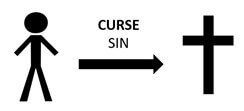
Galatians 3:13 “Christ redeemed us from the curse of the law by becoming a curse for us. For it is written: ‘Cursed is everyone who is hung on a tree.’”
Unfortunately, removing our sin, forgiving our sin, is only part of the solution. That makes us innocent, but we have no positive righteousness. Taking away our sin just places us back in the Garden of Eden. Where we will sin again.
Remember, in the Garden, Adam and Eve sewed fig leaves together to cover their shame and nakedness. But that wasn’t good enough.
So, what did God do?
Genesis 3:21
He made garments of skin for them, didn’t He? Adam and Eve must have witnessed the killing of an animal or animals, watched God skin them, and then watched Him make garments suitable for them to cover their shame.
Visibly communicating to his rebellious creatures that there had to be a substitutionary sacrifice for them. Something – pre-figuring SomeOne – dying for them; AND, in the very same sacrifice, the provision of a covering fitting for them.
And that’s why we have the Incarnation. Jesus Christ had to not only die for us as the sacrificial lamb; He had to LIVE for us, to provide a covering fitting for us.
He had to live a perfectly sinless human life and earn real, authentic human righteousness.
In His deity, the Son of God would always be perfectly righteous. But that’s divine righteousness. Inherent in God.
Human righteousness had to be fought for. In His human nature, Jesus Christ had to resist sin, resist temptation. At every point that we face it. In every way imaginable. And He had to remain sin-free. Sinless. Becoming perfectly righteous in his human nature by His active obedience over the space of some 30+ years. Obeying the Law of God at every point, faultlessly, earning the blessing that was promised for obedience.
And it’s that righteousness that He gives to me. To you. Freely!

Zech 3:3-5 Rom 3:21-22 Phil 3:8b-9
Philippians 3:8b-9: “…knowing Jesus Christ my Lord, for whose sake I have lost all things. I consider them rubbish, that I may gain Christ and be found in him, not having a righteousness of my own that comes from the law, but that which is through faith in Christ – the righteousness that comes from God and is by faith.”
And …
*** Back to the story… ***
… it began at His incarnation. His birth. Where we figuratively see Him take on the stench of sin in a stable.
So, Jesus is born, wrapped in swaddling cloths and placed in a manager, a feeding trough. What happens next?
The Story of the Shepherds
Luke tells us that there were shepherds living out in the fields nearby, keeping watch over their flocks when suddenly an angel of the Lord appeared to them and the glory of God shone around them. And they were terrified.
I don’t know about you, but every time I read that passage, I have to laugh. It’s a classic British-style understatement! At least it is to me…
First of all, let’s take a look at the shepherds in the fields.
It’s highly unlikely that December 25 is the birthdate of our incarnate Lord. In fact, there’s an interesting history behind the selecting of Dec 25 as the birthdate for Jesus, but that’s not the subject of this message.
It’s more than likely that the actual date is sometime in the Spring. And you can see something of that with the shepherds right here in the text.
They were out in their fields keeping watch over their flocks at night.
The responsibility of a shepherd was to protect his sheep, so traditional practice was that the sheep were brought in a fold at night and the shepherd literally set up his bed in the gate, so if any tried to get out, he could stop them. This passage certainly doesn’t say the sheep were wandering all over the place; rather it says the shepherds were watching them at night. The only logical place to watch them all at night was in a sheep fold. At night, it would be pretty difficult to see them all if they were wandering all over the place, wouldn’t it?
You see the same language with Jesus not only saying in His “I AM” sayings that He is the Good Shepherd and His sheep hear His voice. He also said: “I am the gate (door)”, letting His sheep into the fold, and protecting them from wandering off as dumb-as-a-rock sheep tend to do.
And also, since the shepherds were out in the fields at night, it’s highly unlikely that it was in the dead of winter.
In winter, there would be barely enough grass to pasture the sheep. Same thing in summer, really, because the grass would be burnt up. In the Spring, however, the pasture was perfect for the flocks and especially for lambing season.
The season when the grass is greenest is just before the Passover when there needs to be a considerable number of lambs available for the annual sacrifice and so the shepherds would be out in the fields looking after them, protecting them, doing their job. Doubtless in a fold during the evening hours but pasturing all day long. To ensure that an abundance of spotless lambs – lambs without blemish – were available for the Jewish feasts and sacrifices, especially the annual Passover feast.
Think of it … by implication at least, the birth of Christ was more than likely at about the same time period as the annual Passover.
Luke 2:9
So, the shepherds are out in the fields and all of a sudden, an angel appeared to them and the glory of the Lord shone around them.
Shepherds were regarded as the lowest of the low when it came to social standing. And it’s just like God – isn’t it? – to announce the single greatest event in all of human history to that date to a bunch of social outcasts.
Then they’re told a Savior has been born to them, and by extension to us, who is Christ the Lord – the Messiah.
And the proof? They will find him wrapped in swaddling cloths lying in an animal’s feeding trough.
And then all of heaven opens up with the angelic host singing and praising God, saying:
“Glory to God in the highest,
and on earth peace to men on whom his favor rests”
Then the lights go out, it’s pitch black again, and the shepherds agree to go and check it out.
I can’t help but laugh, though, at the colossal understatement here.
Think about it…
Dead of night. Dark. Quiet, and the shepherds minding their own business just being shepherds.
Next thing they know is the lights are turned on. Not just any light, either – the ultimate light. The Glory of God – the Shekinah Glory of God – the same light that Paul describes about his encounter with Jesus on the road to Damascus as being brighter than the noon-day sun (Acts 26:13).
And then the whole night sky was filled with an army of angels surrounded by the light of the Glory of God singing His praises.
You better believe they were terrified. Scared out of their wits. I would be, too. Wouldn’t you?
And then just as suddenly, the lights were turned out and all is dark and silent again.
What did the shepherds hear? They were told that the one born was our Savior … who is the Messiah … who is the Lord. They don’t know His name yet – “Jesus”, which means “God Saves” – but they know now that he is God with us. “Lord” as mentioned a previous time, meaning “Adonai”, is the supreme title for God Himself.
The one born is one and the same Savior and Adonai. Immanuel. God with us.
And if anyone made the connection of the lamb without blemish for the annual Passover feast and the birth of the Spotless Lamb Without Blemish, surely it had to be the shepherds whose very job was cultivating lambs without blemish!
Luke tells us that they discussed things amongst themselves and then hurried off to find Mary and Joseph, and the baby lying in the manger just as they had been told by the angel.
Truth confirmed!
Remember, there were many people in Bethlehem that night because of the census. There must have been more than one baby around at that time. The unique difference was that this one was lying in a manger. God with us lying in a feeding trough. What an image!
But look at what happened next:
Luke 2:17 … “When they had seen him, they spread the word concerning what had been told them about this child…”
They couldn’t contain themselves! They told everyone they could find what had happened. They weren’t concerned or afraid of what people might think of them; they just told people about Christ.
And all who heard it was amazed (Luke 2:18).
What was Mary’s response?
Luke 2:19 … “But Mary treasured up all these things and pondered them in her heart”
You bet she did.
What about us? What about me?
Do we tell everyone about Christ, or do we keep our mouths shut because we’re afraid of what people might think of us?
Of course, there’s a timing and context, but as a matter of principle, though … are we reluctant to be witnesses of Christ or bold?
The principle here is to be bold and just open our mouths. It’s not our job to convert anyone – that’s God’s prerogative and His alone. It is our job to be truthful witnesses for Christ.
Just like the witnesses that Luke labors to point out in these early chapters who confirm the story he’s telling … and these witnesses are full of integrity and trustworthy.
Are we full of integrity and trustworthy? Are we truthful in our witness?
And, like Mary, do we ponder these biblical truths in our hearts, or just pass them quickly on by as just a nice little Christmas story heard every year along with the story of Scrooge or the Grinch that stole Christmas? After all, there’s a lot of other busy-ness to deal with in our lives as well, right?
But this is a time to reflect and ponder deeply all over again, isn’t it?
God with us … taking on flesh, a human nature, as an infant … destined to live a perfectly sinless life … earning perfect human righteousness for a people who despise and hate him … taking on his enemy’s sin … enduring the wrath of a Just and Holy God in place of his enemies … dying a horrific, torturous death … being resurrected 3 days later … ascending to heaven … right now sitting at the right hand of God … and will be coming again in Glory.
Christ came to LIVE for us and provide perfect human righteousness for us because our own righteousness will never be more than filthy rags (Isaiah 64:6). The best we can do – our fig leaves – is never good enough. We need clothes fitting for us and that’s something only God can provide (Gen 3:21).
That’s the blessing of Christmas!
He takes away our sin – the curse – and provides perfect righteousness – the blessing – to anyone who will put their trust – their faith – in Christ and in Christ alone.
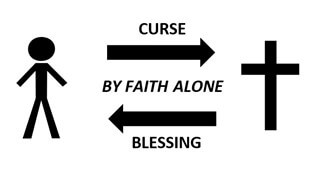
What about you? Have you truly – I mean really put your personal faith and trust in Christ? If not, then in the name of Jesus Christ, do it now!
And, just as the shepherds returned to the fields, back to their day jobs, “…glorifying and praising God for all the things they had heard and seen, which were just as they had been told.” (Luke 2:20), we can do the same seeing through the eyes of faith.
So, what’s next?
Well, as has been aptly said:
“The first time He came there was no room for Him. The next time He comes, the whole world won’t be able to contain His glory.” John MacArthur
He is coming again. Praise God!
He is coming again in Glory.
To take those of us who truly do believe home.
Let’s pray…
